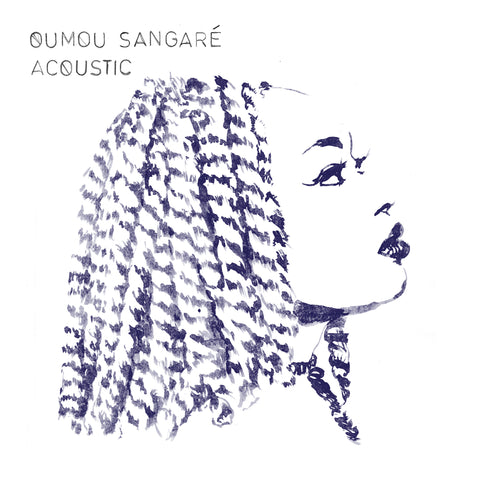Executive production and A&R - Laurent Bizot
Artwork - Jérôme Witz
From a photo by Benoit Peverelli
Graphic design - Element(s)
Oumou Sangaré - Lead Vocal
Guimba Kouyaté - Acoustic Guitar Benogo Diakité - Kamele Ngoni
Emma Lamadji - Background Vocals
Kandy Guira - Background Vocals
Vincent Taurelle - Célesta (1,5,9,10), Organ (2,7,8,9)
Recorded by Bertrand Fresel assisted by Philippe Coisne at Studio Midi Live
Mixed by Bertrand Fresel at studio Juno
Mastered by Adrien Pallot at Chab Mastering
All songs written and composed by Oumou Sangaré
Published by Nø Førmat!
In 2017, the album Mogoya signalled the long-awaited return of Oumou Sangaré after eight long years during which the Malian singer devoted herself to managing her numerous businesses (hotels, agriculture, pisciculture, cars…). With that album, recorded in Stockholm and Paris, the woman who once sold water on the streets of Bamako and has since become a global star and prosperous businesswoman reconnected with her audience, treading a fine line between her attachment to the traditional music of Wassoulou, the region of Mali which she hails from, and technological dislocation, gracing her fans with songs whose vital force was still intact and laying bare a heart that has remained as ardent as ever.
In return, Oumou suddenly found herself propelled into a new dimension, that of pop culture. Painted by the Congolese artist JP Mika for the front cover, remixed by Sampha, St Germain, Malik Djoudi and others for the follow-up Mogoya Remixed, and even sampled by Beyoncé (‘MOOD 4 EVA’ on The Lion King: The Gift album), never before had she appeared so far removed from the land of her birth – an impression that this new ‘unplugged’ version of Mogoya, ‘Acoustic’, proposed by Laurent Bizot of the Nø Førmat! label and magnificently undertaken by the artist, is designed to rectify. The acoustic apparel of the songs restores an authenticity that comes from committing to the initial take, without any safety-net or retouching. In other words, the truth of a rare moment that’s bonded to the emotional intensity emerging from it.
“I suggested to Oumou that she record this album, which is a kind of Mogoya Volume 3, after a concert she gave in London to celebrate 15 years of No Format. At that concert, for the first time ever, she had agreed to try out this acoustic approach, which is all about letting go,” says Laurent Bizot. “The space it created for her voice was really wonderful,”. The album was recorded in two days at the Midi Live studio in Villetaneuse, in ‘live’ conditions, or rather those of an all-night vigil, without the comforts usually available in that kind of technical environment – no amplification, no retakes or overdubs, no headphones, each musician tuning into the ensemble whilst adding their own personal touch, their nuance. With this bare-bones egalitarian treatment, there emerged a group dynamic and a warmth that have become rare commodities in the music of today. Gathered around the incandescent voice of Oumou, in the same room as her, were the backing singers Emma Lamadji and Kandy Guira, the guitarist Guimba Kouyaté and the faithful Brahima ‘Benogo’ Diakité, Oumou’s cousin and virtuoso player of the kamele ngoni, who has been with her since Moussolou, the epoch-defining debut cassette she released back in 1989, at the age of 21. To this diminutive assemblage was added, on toy organ and celesta, Vincent Taurelle from the Parisian collective Albert, who made such an enormous contribution to the success of Mogoya and who, in this otherwise strictly African context, added an almost ‘exotic’ note to proceedings.
The nine songs from Mogoya that Oumou revisits in this pared-down and unplugged fashion offer her the chance, with an almost naked voice and no distractions, to evoke the bitter counterweight to her exceptional success; in other words, the jealousies, grudges, betrayals, and other scourges that this woman, often deemed too free, transgressive and downright fortunate for the profoundly conservative society to which she belongs, has had to endure for so many years. But far from cramping her style, this weave of malice seems to have stimulated her, and motivated her to reclaim the eminent role of Mali’s leading opinion-maker and influencer that she had borne since Moussolou, a cassette that sold over 250,000 copies and did so much for the feminist cause in West Africa. ‘They slandered me, and attributed the worst vices in the world to me,’ Oumou sings on ‘Yere Faga’ (‘Suicide’ in Bambara). It was from this merciless struggle against prejudice and adversity of every kind, from which she has emerged the victor, that songs like ‘Kamelemba’ (‘Playboy’), ‘Kounkoun’ (‘Bad Seeds’), ‘Mogoya’ (‘Human Relations’) and ‘Bena Bena’ (‘Ingratitude’) were moulded.
And it’s that capacity to fight her corner, to confront suffering, whilst preserving her connection to certain values essential to Malian society (‘Fadjamou’, ‘Mali Nialé’), that she celebrates in her songs, presented here in their natural state, without embellishments or added extras. It’s a corpus of pure will and revenge, to which two older compositions have been added at her suggestion: ‘Saa Magni’, in which she laments the passing of Amadou Ba Guindo, member of the Orchestre National Badema and one of the architects of her rise to fame, and ‘Diaraby Nene,’ one of the most important songs in her entire repertoire, that came wrapped in scandal, in which she dared to tell the world about the excitement of her first sensual encounters. “I wrote the lyrics when I was fifteen years old,” she remembers. “That’s when I fell in love for the first time. I sing without restraint about the caresses of my hands on the body of my love and the shivers that the contact with his skin gave me.” The song was something inconceivable in a world where reserve and modesty are mandatory, especially where women are concerned. Taken from the album Moussolou, ‘Diarabi Nene’ confronted taboos head on and made Oumou Sangaré seem like an anti-griotte, a revolutionary who had become, from one day to the next, so popular among West African youth that she would press her advantage by denouncing, without let up, female circumcision, forced marriages and polygamy, a system that was responsible for the collapse of her own family and continues to wreck thousands of lives.
Now an established artist, celebrated all over the world, Oumou Sangaré continues to explore these themes with the same sense of freedom, the same audacity that she displayed when that first cassette came out thirty years ago now. It’s the fighter, the undefeated rebel that you find here on this snapshot of an album that, in a time when music has become the hostage of endless digital manipulations, offers extra proof of her courage and generosity, the qualities of an artist who’s still in the process of growing, who’s still at the forefront of the struggle for the liberation of the African women, far beyond the confines of both tradition and modernity.




